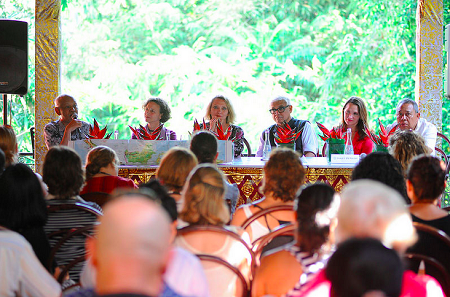Ubud, Bali. August 2019. Amazingly, the Bali-based Ubud Writer’s Festival (now upgraded to the Ubud Writers & Readers Festival or UWRF) has been reeling in the page-borne favourites to the highlands of Bali for 15 years. This year, between 23-27th October, and billed as Southeast Asia’s leading festival of words and ideas, the festival promises a star-spangled lineup of more than 160 authors, journalists, artists and activists from 30 countries and all corners of the globe.
This year the festival says that it is promoting inclusive stories, ideas and solutions at a time when amplifying diverse voices and rarely-heard perspectives is more critical than ever. With such luminaries as Nelson Mandela’s grandson Ndaba Mandela, to bestselling Rwandan survivor Clemantine Wamariya and award winners like Hanif Kureishi, Booker Prize nominated Anuradha Roy and bestselling Italian novelist Giuseppe Catozzella, the event promises to be a special one, even in the long list that has gone before it.
Some of the world’s most outstanding writers will make themselves available to visitors. Courtesy Ubud Festival.
Representing local talent, one of Indonesia’s best-loved and most widely translated poets Sapardi Djoko Damono, double-winner of Australia’s Miles Franklin prize Kim Scott, and Dee Lestari - one of the new lights in Indonesia’s contemporary fiction scene.
“After 15 years, we feel our Festival has fulfilled its purpose of putting Ubud on the literary map, nationally and internationally, and of sparking interest in Indonesian literature,” says UWRF Founder and Director, Janet DeNeefe. “Most international visitors in the early days said they knew nothing about Indonesian writers, but this has slowly changed,” she added.
This year’s key theme, karma, is drawn from a Hindu philosophy and will explore the impact of our personal and collective actions on our social and physical environments. “As actions in their previous life affect their present, and deeds committed in the present affect their future, Balinese Hindus are aware their fate is not divine in origin, but in their own hands,” noted DeNeefe.
This year, it’s much more that just writers, says Janet deNeefe. Courtesy Ubud Festival.
For many in the West, karma is a simplification of justice served. But for Balinese Hindus, Karma Phala is the spiritual principle that each action has a consequence equal in force, and similar in form. Consequently, conversations between literary luminaries, emerging writers, and journalists will ask whether we truly understand the consequences of our actions, and how we can best respond to the actions of others. As the organisers note, this should provoke “fiery discussions, powerful performances, (lush) literary lunches, and after dark events that delve into the heart of every gripping story: decision and consequence.”
To promote even more literature, the festival is looking for emerging writers: they want your stories. Once selected, emerging writers will be supported by the Yayasan Mudra Swari Saraswati and the Indonesian Writers Patrons to fly to Bali and launch the annual Emerging Writer’s Anthology.
If that is not enough to convince you, consider the dozens of lovely places to stay in the Ubud region – that will mostly offer Accommodation Partners discounts up to 20% on Program costs. Plus the local attractions including arts and crafts shops, nearby villages awash with artists’ workshops and galleries. There are also some remarkable architectural and natural sights (rice paddies, kayakable canyons) and a general spiritual feeling of well being thanks to the mellow environment and deep beliefs of the local people.
“In 2019, we’re not only celebrating our 15th year as Southeast Asia’s leading festival of words and ideas. We’re also celebrating the fact that Indonesia is home to world class literature, art, film and food – and finally the world is taking notice,” DeNeefe concluded.


